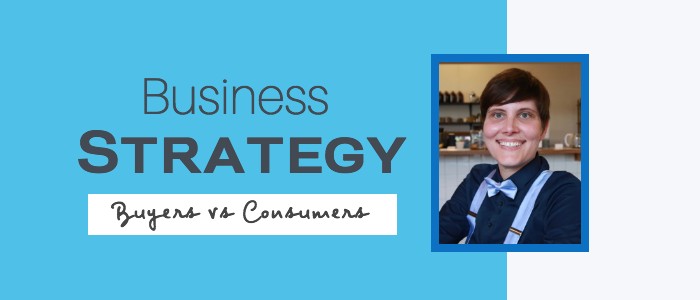When formulating strategies for your business, branding, and marketing, your target audience is kept in consideration. What’s often overlooked in the small business sector is buyers vs consumers. No, these aren’t the same persona although there is a lot of similarities. Your strategies likely will, and should, change when catering to one vs the other. Hint, in a later blog I’ll cover what the more successful brands cater to and which is more important. (Hint, it’s consumers.)
So as you start this new year, you can plan more accordingly on your strategies for buyers vs consumers. I promise, once you get it right it pays off.
Buyers vs Consumers
Buyers
A buyer is quite simply a customer. Someone who purchases a product or service from a seller or provider. It doesn’t matter what the details are. If you exchange money to secure goods, you become a buyer. A financial decision-maker.
86% of customers are more likely to purchase when companies make it easy for them to do so
Consumers
A consumer is the users of said products or services that a buyer purchases. Consumers are also known as end-users or simply, users. This person is the last owner of the goods. A buyer can be a consumer. I buy myself most of the videogames I play, therefore I am both the buyer and the consumer. If you give me a game as a gift, I am the consumer and you are the buyer. This is a really important part of the dynamics of buyers vs consumers. This is because most strategies are centered around buyers instead of the consumers.
57% of consumers prefer to shop online, 31% of consumers prefer visiting the physical shop, while 12% of consumers said both ways are the same for them
Category
Businesses are always at least one and sometimes both categories. Those categories are Business to Business (B2B) and Business to Consumer (B2C). In B2B you are sometimes dealing with only a buyer. If you’re a wholesaler your clients are B2B buyers. They’re going to resell the product. Their clients are the B2C consumers. This means that your category of business does not guarantee your customer type.
Creating a Plan
This is going to vary greatly by industry but the first things to nail down are your category and customer types (or type.) In some cases, you’ll have both. Most of my buyers are also consumers. But this may not be the case for you. This means you may have to create two strategies for your marketing plans.
As one example. I have a client who makes products. They only sell wholesale but they market instead to end-users. This means they’re mainly dealing with buyers but they market to consumers. This strengthens their relationship with buyers and builds a stronger case for the brand. By increasing awareness, education, and demand among consumers, business with buyers will grow.
So put thought into who has the most impact for your business and how you can reach them best. Also, consider how many buyers and consumers are in the equation. Buyers often have decision-makers. If not, you’ve reached the top buyer and possibly consumer. You may have to cater to a full-sized leadership team a technical team. Some organizations have buyers in the procurement department. So do your research. Know who you need to reach at what steps for buyers and the same for consumers. Which may or may not be at a different level.
____________
What input would you like to share on your experience with buyers vs consumers? I’d love to hear from you! You can Contact Me and don’t forget to follow me on LinkedIn for more content like this.

